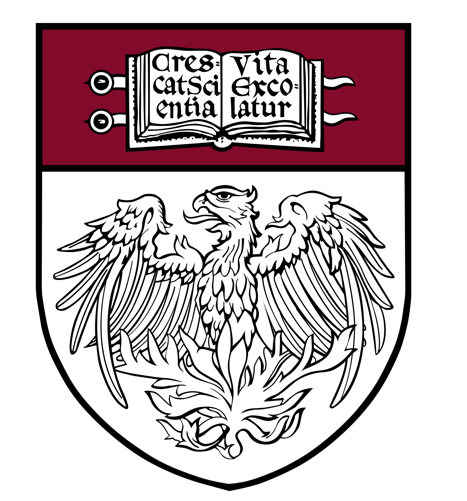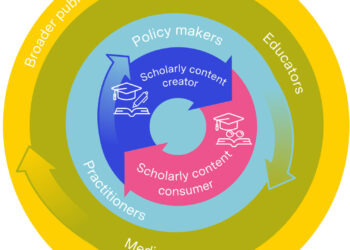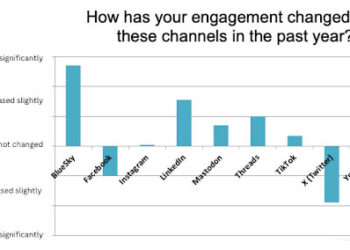
I recently participated in a career education and networking event for at the University of Chicago, where I attended graduate school. Each year, the U of C asks alumni working in various fields to come back and talk to second- and third-year college students about what they do and about what a career path in their respective field might look like. The day consists of various industry panel discussions followed by a less formal lunch with tables organized around industries.
Publishing and journalism were represented on the same panel discussion but then separated into different tables at lunch for some reason. The U of C did a fairly good job of representing different areas of the (traditional) publishing industry—with alumni from consumer magazines, higher education, trade publishing, and (me) professional publishing.
Student perceptions of the publishing industry, as evidenced from which majors attended the panel discussion and joined the publishing table for lunch, were telling.
I arrived at lunch a few minutes early and so was the first to sit down. Two students arrived shortly thereafter. I asked them what they were studying and both answered that they were physics majors. An interesting conversation began and was moving right along until I asked them what facets of publishing they were interested in, which is when they both realized they were at the wrong table.
After the physicists decamped, the table was soon occupied by a new wave of students, all of whom were English majors.
As an English major myself, I understand what attracts English majors to the field. English majors tend to love literature and, more generally, language, and so what better industry to work in than publishing? English majors, however, tend to gravitate, logically enough, towards editing at trade publishers and consumer magazines—and want to work for houses like FSG, Little Brown, Penguin, Random House, Harper Collins (Harper Collins’ executive editor for science fiction and fantasy is a U of C alumna and was at the lunch table), or Condé Nast.
These are great houses, wonderful jobs, and fine aspirations. But they also represent a tiny fraction of the positions in the publishing industry—and an even smaller fraction if one thinks of “publishing” more broadly, extending to old media, new media, and other purveyors of (mostly online) information (e.g. Bloomburg, LexisNexis, the Thomson half of Thomson Reuters, etc.). And while this broader information industry, in which publishing (including online publishing) remains a core activity, will always have need of talented editors, there are other roles in the industry that are equally important—and more vital than ever to the industry’s future.
Publishing and media companies have a strong need for both content experts and technology experts. Scientific publishers need science majors. Medical publishers need doctors and life science majors. Higher education publishers need people with subject matter expertise in the subjects for which they produce textbooks for (math, economics, anthropology, geology, psychology, etc.). And all of these companies need technology experts, business development experts, and marketing experts, among many other roles.
Unfortunately, the publishing industry has not done a good job of marketing itself to college students. It’s still perceived as an industry for English majors which consists entirely of trade book publishing and consumer magazines. As a result, many talented students go into other industries without even giving a thought to a career in publishing. Those who do eventually find their way into the industry do so by accident not by design.
I was looking for career resources from the Association of American Publishers in preparation for the U of C event and was heartened to see the following statement on their career site:
“Whoever you are, whatever your background, and whatever your interests, publishing has a place for you! Publishing is about business, design, editorial, marketing, sales, and technology.”
The AAP gets it exactly right. Well, except for one little thing. As the AAP’s career site is called “Book Jobs,” they all but guarantee that no one outside the English department will ever see it. We need to move beyond the book—beyond the containers developed in the age of print technology—when communicating about our industry. It’s not about the book. It’s about information.
Mediabistro seems to understand this. While still weighted towards trade books and consumer magazines, the site (as evidenced by both its name and its content) has embraced new media and other assorted information industry careers. I hope that major industry associations do the same with both their Web presence and with active outreach on college campuses.
The failure to recruit the range of expertise our industry needs is not limited to the US. Skillset, an industry body in the UK for creative media, released a report last year (covered by both the Guardian and Bookseller.com) identifying a “critical” digital skills gap in the UK publishing industry. In a commentary on the Skillset report, industry consultant Brambletrye Publishing put it well, writing:
“Over the past few years, I’ve often commented on the limited extent of the expertise in digital technologies in some major publishing houses, who tend to outsource almost everything. Outsourcing is no bad thing; it’s what publishers do, and it works well. But, in the digital domain, if done to excess it can feel as though the publisher abdicates responsibility for their digital business, placing in the hands of a third party technology company, thereby letting the technology drive the business, rather than the other way round.”
We are in the midst of the biggest shift in communication since the invention of the printing press—and arguably since the invention of writing itself. The Web, mobile technologies, social media, and semantic technologies are remaking the publishing and information industries. In order to attract the talent we need for the 21st century, it is critical to do a better job of communicating the career possibilities in our industry to college students. Yes, we want the best and brightest from the English department, but we also need engineers, scientists, and MBAs. Now that Wall Street’s brain drain has somewhat abated, perhaps we can redirect some of those graduates to Midtown, Philadelphia, and DC where their skills and talents can be used laying the foundation for the communication epoch that has just begun.
Discussion
7 Thoughts on "What Is a Career in Publishing? Recruiting the Talent We Need for the 21st Century"
Well put, Michael. Once those young publishers come to their first jobs, we need to be sure they get good training and mentoring in the industry as it exists–now and later. And can we redirect some of them to the great association publishers in Chicago?
I wish when I was in college something like this would have been available. I have an English degree and a creative writing minor. I’ve loved publishing and went into the retail end, then into running my own business as an independent publishers rep for k-12. Now I handle eBook sales in higher ed across n. america. Unlike what students have for options today and resources to connect with, I learned it all through trial and error and seeking out the info in different ways, granted this was also before the net hit big, I think that will date me just fine.
I never saw the appeal of editing, always been a salesman, but I think nowadays publishers need to look at people with a vast background and really take a look at personality, interests of people, because many cases you can train someone and people will surprise you with what they can learn and where their passion is at.
Mike – this is very interesting. But, I’m sure like many others, I came to publishing through other means. I was in IT departments for many years before I stumbled into an IT role (project management) in a publisher and then moved into business strategy and product development from there.
My point is that many of the technologists don’t think of the industry in which they’ll work when they’re in school. They move from industry to industry according to their lateral function (I was in 7 industries before landing in publishing).
I heartily agree that publishers need to attract technologists at every career stage. It would also be great if English majors intending to go into publishing were exposed to the technical ramifications of that intention in school. But then again, these are English programs not publishing programs.
Perhaps organizations that support publishing (like aap) and publishers should be spending some more time at campuses (career days and the like) educating students about our industry and its needs going forward.
Great food for thought – thanks!
Ann
Hi,
Although I’m an Eco major, I’ve always loved literature and books and everything related! I write as well, but have not published too much and although an Editor’s job is what I longed for as a kid, I have started thinking of looking at the publishing industry on the whole. There is one teeny-tiny issue though, how does one get a job at a publishing house? I want to do an MBA, learn the skills to start something of my own. But I doubt a Random House or a Harper Collins will come to a B-school to recruit. What’s the way to get into a publishing house???
Some of the larger publishers do recruit MBAs (see, for example, McGraw-Hill’s MBA program: http://bit.ly/9K5gFB). Alternately, you get a job in publishing the same way you would in other industries. Try applying for summer internships while in school to build experience and then start applying for jobs, ideally leveraging the connections you make while interning.
Dis really serve as great tutor in pulishing. It’s just that i am undergraduate with no idea about publishing. Bt, i believe i have a brillant mind & the publishing potential, i just dn’t no how to start & i need help. I ‘ll really appreciate if you can write me about the way out. I look forward to hearing from.


